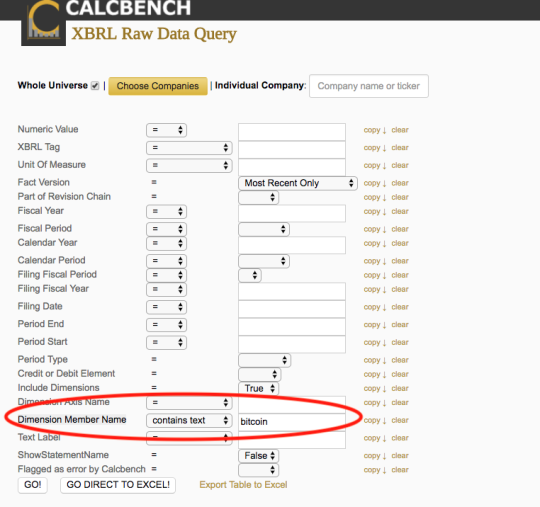The suggestion from one of our Calcbench followers seemed harmless enough: “Hey, you guys should enter ‘bitcoin’ into the Interactive Disclosure database, and see what comes up!”
Oh boy, did we enter a rabbit hole.
As most financial enthusiasts already know, bitcoin is one of the leading cryptocurrencies today: a currency that can convert into “real dollars” at either end of a transaction, but otherwise exists outside the banking system. The value of bitcoin fluctuates like any other currency on the open market, while bitcoin transactions are tracked (and secured) using blockchain technology.
Before we delve into our footnote disclosures, know that current users of our Advanced XBRL Query Tool are able to do tag searches for bitcoin. One such search might look like this picture:

Here is a small sample of what was returned from the query:

Note that the values are relatively small, but they are reported and you can find them quickly.
So what are companies saying about bitcoin?
Foremost, not many companies are saying much: anywhere from eight to 12 filers in any given quarter, over the last year or so. Mentions of bitcoin usually appear in the Risk Factors, Accounting Policies, or sometimes in a special note. But so far no great number of companies mention bitcoin at all.
Those companies that do mention bitcoin are generally disclosing the value of bitcoins they possess. Even then, the disclosure can be, well, a bit strange. Consider ”this filing from Cannabis Sativa reported on Nov. 14, headlined as “Garycoins:”
At September 30, 2017 and December 31, 2016, the Company has possession of 900,005,098 cryptocurrency coins named “President Johnson” trading under symbol “GARY,” which were contributed to the company by a director during 2016 with a cost basis of $5,931. President Johnson coins are reported as digital currency. At September 30, 2017 and December 31, 2016 the value of these coins was estimated to be $15,804 and $26,280, respectively, computed by converting to a bitcoin value in US Dollars and adjusted for estimated liquidity limitations.
Gary Johnson, we should note, was the Libertarian Party’s candidate for president in 2016. He lost.
Meanwhile, MGT Capital Investments made quite a different disclosure on Nov. 9. MGT is a cybersecurity firm based in based in North Carolina, and one line of business is bitcoin mining: the processing of transactions using blockchain technology, to keep bitcoin transactions legit. MGT warned in its Risk Factors that operations could be jeopardized if the greater bitcoin community adopts new mining protocols that result in incompatible versions. (Think VHS vs. Beta wars in the 1980s over videocassette standards, or Blu-Ray vs. HD standards for DVDs if you’re under 35.)
To the extent that a significant majority (approximately 80 percent) of the miners on the Bitcoin Network agree, the Bitcoin Network could be subject to new protocols and software that may adversely affect an investment in the company. In such an event, or in the event a developer or group of developers proposes a modification to the Bitcoin Network that is not accepted by a majority of miners it would result in, two or more competing and incompatible blockchain implementations known as a “hard fork”. In such a case, the “hard fork” in the blockchain could materially and adversely affect the perceived value of bitcoin as reflected on one or both incompatible blockchains that as a result of which may adversely affect an investment in the company.
And at least a handful of companies are starting to talk about how they accept bitcoin as payment. That does merit disclosure, since (a) bitcoin isn’t legal tender backed by any government; and (b) the currency also experiences enormous volatility: from $970 at the start of 2017 to more than $8,000 as of this month.
Snap Interactive, for example, filed this bit of disclosure on Aug. 8:
In August 2017, we began accepting Bitcoin as a form of payment for purchases on two of our applications, Camfrog and Tinychat. In the future, we may accept Bitcoin and other forms of cryptocurrency across our entire portfolio of applications. Bitcoin is not considered legal tender or backed by any government and has experienced price volatility, technological glitches and various law enforcement and regulatory interventions. At present, we do not accept Bitcoin payments directly, but use a third party vendor to accept Bitcoin payments on our behalf. That third party vendor then immediately converts the Bitcoin payments into U.S. dollars so that we receive payment for the transaction at the sales price in U.S. dollars. The use of cryptocurrency such as Bitcoin has been prohibited or effectively prohibited in some countries. If we fail to comply with prohibitions applicable to us, we could face regulatory or other enforcement actions and potential fines and other consequences.
Bitcoin or bitcoin?
If you’re a cryptocurrency enthusiast, you might notice that we used “bitcoin” with a lowercase b throughout most of this post. That’s because most filers did the same in their disclosures. A small number used the uppercase B, since the technology to create the currency from blockchain is formally known as “Bitcoin.”
But already the word has become so commoditized that “bitcoin” is usually how people describe the units of currency in mass media— and, apparently, in SEC filings. So we used that convention as well.